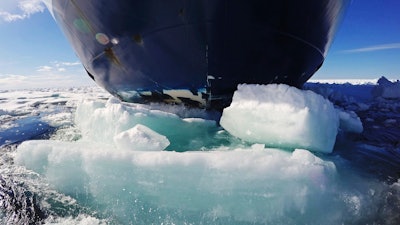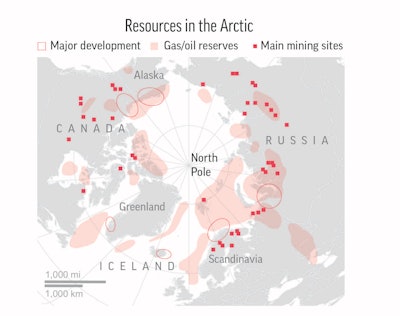
LANCASTER SOUND, Nunavut (AP) — From a distance, the northern shores of Baffin Island in the Arctic appear barren — a craggy world of snow-capped peaks and glaciers surrounded by a sea of floating ice even in the midst of summer (view photos in gallery).
Yet beneath the forbidding surface of the world's fifth largest island lies a vast treasure in the shape of an exceptionally pure strain of iron ore. The Baffinland mine, part-owned by a local company and ArcelorMittal, one of the world's biggest steel producers, is believed to hold enough ore to feed smelters for decades.

As climate change pushes the cold and ice a little farther north each year, it is spurring talk of a gold rush for the Arctic's abundant natural resources, prized shipping routes and business opportunities in tourism and fishing. The Arctic, including the fabled Northwest Passage between the Atlantic and the Pacific, is among the last regions on earth to remain largely unexplored. In April, U.S. President Donald Trump signed an executive order to reverse Obama-era restrictions on oil drilling.
Yet industry experts, researchers and veterans of the Far North say there remain many obstacles to reaping the riches once blocked by the ice. Conservationists also oppose the large-scale extraction of Arctic resources, fearing that the fragile environment will be irreparably harmed.
The Associated Press took a first-hand look at the Arctic on a month-long, 10,000-kilometer (6,200-mile) journey aboard the Finnish icebreaker MSV Nordica, along with researchers specializing in Arctic development. The journey was in part an effort to promote the ship to potential clients in North America as an "icebreaker for hire."
"As the world demand for raw materials is ever increasing, and (with) a realization that a large part of the unexplored deposits are in the Arctic, there is a natural shift to focus on that area," said Mads Boye Peterson, head of Denmark's Nordic Bulk Carriers Shipping.
Peterson's company sent a freighter through the Northwest Passage four years ago to demonstrate the feasibility of using the route to haul cargo during the summer months, when melting sea ice opens up these frigid waters. But he also noted that rising temperatures make operations more difficult because moving floes are less predictable than unbroken sheets of ice.
"On the surface it might look like a slam dunk," he said. "But it's actually a lot more complicated than just something you decide to do overnight."





















